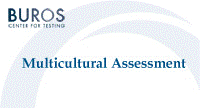Buros-Nebraska Series on Measurement and Testing

Multicultural Assessment in Counseling and Clinical Psychology
Date of this Version
1996
Document Type
Book
Abstract
Select multicultural instruments that are paper-and-pencil attitude and projective tests, developed recently and cited in refereed journals, are presented. New data are treated to multivariate statistics, exploratory and confirmatory factor analyses, structural equation modeling, cluster analyses, reliability estimation, and norm transformations. Tests are shown to be construct-related to multicultural theories and/ or criterion- related to sociocultural variables. That is, instrument validity is supported through the theoretical groundedness of obtained results, through theory-building based on data interpretation, or through criterion predictions.
Test bias of mainstream instruments are discussed statistically as well as conceptually. Differences in test scores are given an interpretation different from the conclusion that deviant scores indicate deficits. Clinical judgement is shown to be subject to individual bias and to clinicians' immersion in their racial and cultural contexts and their inability to see their imposed bias. Decision trees, guidelines, and assessment reports are provided to illustrate qualitative methods for contextual diagnosis and integrative clinical judgement. Methods to identify social desirability in multicultural self-reports are discussed. Classical measurement theory is argued to overlook the multiplicity of person-environment reactivity that merits investigation in a multicultural society and in a majority-minority sociopolitical system.
Thus, this work represents empiricism, ideology, and applications, the scientist-practitioner hallmark of professional psychology. True to their professional training in applications, the authors' discourse, tables, and figures are reader- and consumer-friendly. The book has been designed to give counseling and clinical psychology students, researchers, and practitioners information that aims to make them multiculturally effective in their respective roles.
Once again the Buros Institute tradition of being at the cutting edge of measurement concerns is continued by this book.


Comments
Copyright © 1996 by Buros Institute of Mental Measurements
Digital Edition Copyright © 2012 Buros Center for Testing
This book may be downloaded, saved, and printed by an individual for their own use. No part of this book may be re-published, re-posted, or redistributed without written permission of the holder of copyright.